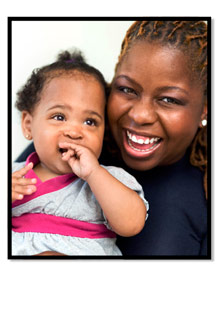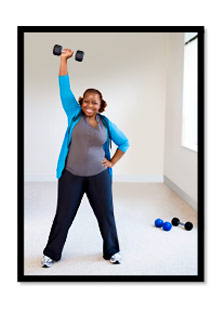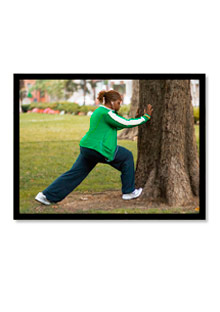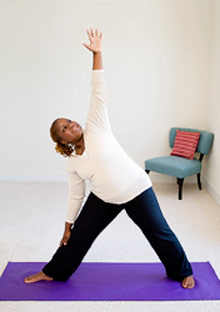
Photo: Gabrielle Revere
After a life-threatening pregnancy, Veronica Chambers was tired, steroid-swollen, and sure she'd never regain her health—or the ability to fit into her skinny jeans. But thanks to an Olympic coach and some full-throttle training, she's on track to be fitter than ever before.
I am by no means a natural athlete. In high school, I claimed to have my period almost four weeks a month so that I could sit on the sidelines during gym. (That my male gym teachers let me get away with this is a crime, but that is another story.) I was the girl that Title IX missed.In my 20s and into my 30s, I made up for my previous inactivity with a vengeance. I didn't just take kickboxing classes at my gym; I studied Muay Thai boxing in a sweaty downtown basement where both guys and girls pummeled me and I pummeled them back. I spent my winters taking tennis lessons at an indoor court and my summer mornings running across the Brooklyn Bridge. I ran the Army Ten-Miler. In the fall of 2006, I found out I was pregnant and added prenatal yoga and water aerobics to the mix. But at 27 weeks I went in for my routine monthly OB visit and learned that I had a severe case of preeclampsia, a life-threatening complication. My doctors told me they needed to deliver the baby as soon as possible or both she and I could die.
Forty-eight hours later, my daughter was born in an emergency C-section. She was 1 pound, 15 ounces. The cure for preeclampsia is supposed to be delivery, but the doctors were still unable to control my blood pressure and I was at risk for stroke. Like an episode of the television show House, a team of specialists watched as I proceeded to go into major organ failure: first my liver, then my kidneys, then my gastrointestinal system. I was so close to dying that they wouldn't let me see the baby. (That finally happened when I was stable enough to move out of intensive care five days later.) I was in the hospital for nearly a month, and the baby, Flora, was there for three.

Photo: Gabrielle Revere
Like most pregnant women, I'd had a plan. I would deliver my baby and take a three-month maternity leave. I would hire a doula, work with a trainer three times a week, and get back into shape in a reasonable time.
So much for plans. My liver and kidney functions gradually improved, my blood pressure leveled out so I was no longer in constant danger of stroke, but I learned that in addition to the preeclampsia, I had something called Sheehan's syndrome. A lack of oxygen to my brain during childbirth had caused a hormonal imbalance. My body was no longer producing enough cortisol, which plays a vital role in helping to regulate the body's response to stress. My only option was to go on steroids, possibly for the rest of my life. Although the steroids would raise my cortisol levels, this was not a fun option: I began to gain weight on the drug—soon I weighed more than I did when I was pregnant.
The hope was that eventually my brain would start making cortisol again, but it wasn't happening. In addition, I had massive uterine fibroids (some as big as 4 pounds) that didn't shrink after pregnancy the way they normally do.
Each week I had a new doctor's appointment. I had ultrasounds and MRIs of my brain and my uterus. I still felt pretty beat up, but once I got the four-week clearance on my C-section incision, I headed back to the elliptical trainer. My newborn baby, a micro-preemie, had her own set of medications and doctor's appointments. My husband, who had been working from home and the hospital's Wi-Fi area, had to go back to the office, so I got up at 4:30 every morning to get to the gym before he left. But nothing was changing. I felt bad and I looked worse.
Then, to paraphrase Fannie Lou Hamer, I got sick and tired of being sick and tired. Two years before, I had interviewed Charles Brown, a psychologist who directs FPS Performance, a coaching practice in Charlotte, North Carolina, for a story about athletes and peak performance. The previous month, he had sent me a newsletter announcing his return from working with the U.S. national white-water team. It occurred to me that what I wanted—what I needed—was someone who could coach me back from illness the way an elite athlete is brought back to the playing field after a serious injury. I wanted strategies for kicking my illness' ass.
I e-mailed Dr. Charlie with trepidation. "It would be too expensive" was my first thought. I also worried that he wouldn't have time for someone like me. He has worked with Olympic athletes in swimming and track and field. He trains world champion triathletes for the Ironman in Kona, Hawaii. To my surprise, he responded right away and we set up a super-reasonable coaching plan: $250 a month.
First, he asked me to sign a coaching agreement. One clause explained that on the rare occasion that one athlete he coaches competes against another, his goal is to maximize each athlete's potential, respect confidentiality, and not provide advantages. This is good, I thought. Should I come up against another preeclamptic new mom with Sheehan's syndrome at, say, a Neiman's sale, Dr. Charlie wouldn't be on the sidelines giving her tips on how to get a cashmere sweater away from me.
So much for plans. My liver and kidney functions gradually improved, my blood pressure leveled out so I was no longer in constant danger of stroke, but I learned that in addition to the preeclampsia, I had something called Sheehan's syndrome. A lack of oxygen to my brain during childbirth had caused a hormonal imbalance. My body was no longer producing enough cortisol, which plays a vital role in helping to regulate the body's response to stress. My only option was to go on steroids, possibly for the rest of my life. Although the steroids would raise my cortisol levels, this was not a fun option: I began to gain weight on the drug—soon I weighed more than I did when I was pregnant.
The hope was that eventually my brain would start making cortisol again, but it wasn't happening. In addition, I had massive uterine fibroids (some as big as 4 pounds) that didn't shrink after pregnancy the way they normally do.
Each week I had a new doctor's appointment. I had ultrasounds and MRIs of my brain and my uterus. I still felt pretty beat up, but once I got the four-week clearance on my C-section incision, I headed back to the elliptical trainer. My newborn baby, a micro-preemie, had her own set of medications and doctor's appointments. My husband, who had been working from home and the hospital's Wi-Fi area, had to go back to the office, so I got up at 4:30 every morning to get to the gym before he left. But nothing was changing. I felt bad and I looked worse.
Then, to paraphrase Fannie Lou Hamer, I got sick and tired of being sick and tired. Two years before, I had interviewed Charles Brown, a psychologist who directs FPS Performance, a coaching practice in Charlotte, North Carolina, for a story about athletes and peak performance. The previous month, he had sent me a newsletter announcing his return from working with the U.S. national white-water team. It occurred to me that what I wanted—what I needed—was someone who could coach me back from illness the way an elite athlete is brought back to the playing field after a serious injury. I wanted strategies for kicking my illness' ass.
I e-mailed Dr. Charlie with trepidation. "It would be too expensive" was my first thought. I also worried that he wouldn't have time for someone like me. He has worked with Olympic athletes in swimming and track and field. He trains world champion triathletes for the Ironman in Kona, Hawaii. To my surprise, he responded right away and we set up a super-reasonable coaching plan: $250 a month.
First, he asked me to sign a coaching agreement. One clause explained that on the rare occasion that one athlete he coaches competes against another, his goal is to maximize each athlete's potential, respect confidentiality, and not provide advantages. This is good, I thought. Should I come up against another preeclamptic new mom with Sheehan's syndrome at, say, a Neiman's sale, Dr. Charlie wouldn't be on the sidelines giving her tips on how to get a cashmere sweater away from me.

Photo: Gabrielle Revere
The first thing Dr. Charlie emphasized to me is that I needed to get the best doctors possible and to ride herd on them. As he explained it, when an athlete like Lance Armstrong gets sick, everybody on his medical team takes it seriously because he's Lance Armstrong. What I needed to believe, and what had to guide my behavior, was that my body was just as important as Lance Armstrong's. The result is that I've fired one set of doctors (a first for me) and replaced them with a doctor who is serious about healing. Goodbye, Doctor "Well, you could die if you don't do what I tell you. Just take the medicine and stop asking questions." Hello, Doctor "Best in the Business, Let's Meet for Two Hours and Come Up with a Plan."
I've also learned that a coach isn't a therapist. A big part of therapy is validation and affirmation, and Dr. Charlie isn't really concerned with that. Yes, I had a really horrifying, scary pregnancy and delivery. It's frustrating to still be on so much medication with so few answers. It's exhausting to have a newborn baby and a job, and be so physically challenged. But we don't waste a lot of time talking about what hurts and why it really sucks to be me these days. Our work together focuses on my body, not my feelings. Our sessions are based on the fact that if I can get it together, I can get back on the field.
I've been now been working with Dr. Charlie for just over 11 months. We communicate by e-mail three or four days a week and talk on the phone every other week. I send him performance evaluation forms, the same ones his professional athletes use, as if my 45 minutes on the treadmill were a trial for the Goodwill Games. Thanks to him, I've made several big changes and hit a few new milestones.
Our work is not about the scale. I already have a great trainer. I love lifting weights with him and doing all those cool plyometric exercises he comes up with to challenge my body. But if he asks me one more time, as I lift a medicine ball while he checks his BlackBerry, "So, are you back in your skinny jeans?" I will scream. Because the answer is no, no, and oh, yeah, hell no. I'm not back in my skinny jeans. Not even close.
And it bothers me. I oh-so casually mentioned to Dr. Charlie that I read an article about a woman who lost 10 pounds in one month. The article had a diet and exercise plan and, well, I wanted to try it. There was silence on the other end of the phone. Dr. Charlie took a deep breath and then very patiently explained that he is not a diet doctor and that for his clients, weight matters only as it affects their ability to reach their athletic goals. So if my goal is to get back to running 10-milers by adding a second daily interval run to my schedule, then we could talk about how to make that happen. But Dr. Charlie does not give a rip about my skinny jeans. What he wants is for me to get up every day and somehow—in the midst of work, marriage, and motherhood—find two or more hours to devote to my physical health.
I've also learned that a coach isn't a therapist. A big part of therapy is validation and affirmation, and Dr. Charlie isn't really concerned with that. Yes, I had a really horrifying, scary pregnancy and delivery. It's frustrating to still be on so much medication with so few answers. It's exhausting to have a newborn baby and a job, and be so physically challenged. But we don't waste a lot of time talking about what hurts and why it really sucks to be me these days. Our work together focuses on my body, not my feelings. Our sessions are based on the fact that if I can get it together, I can get back on the field.
I've been now been working with Dr. Charlie for just over 11 months. We communicate by e-mail three or four days a week and talk on the phone every other week. I send him performance evaluation forms, the same ones his professional athletes use, as if my 45 minutes on the treadmill were a trial for the Goodwill Games. Thanks to him, I've made several big changes and hit a few new milestones.
Our work is not about the scale. I already have a great trainer. I love lifting weights with him and doing all those cool plyometric exercises he comes up with to challenge my body. But if he asks me one more time, as I lift a medicine ball while he checks his BlackBerry, "So, are you back in your skinny jeans?" I will scream. Because the answer is no, no, and oh, yeah, hell no. I'm not back in my skinny jeans. Not even close.
And it bothers me. I oh-so casually mentioned to Dr. Charlie that I read an article about a woman who lost 10 pounds in one month. The article had a diet and exercise plan and, well, I wanted to try it. There was silence on the other end of the phone. Dr. Charlie took a deep breath and then very patiently explained that he is not a diet doctor and that for his clients, weight matters only as it affects their ability to reach their athletic goals. So if my goal is to get back to running 10-milers by adding a second daily interval run to my schedule, then we could talk about how to make that happen. But Dr. Charlie does not give a rip about my skinny jeans. What he wants is for me to get up every day and somehow—in the midst of work, marriage, and motherhood—find two or more hours to devote to my physical health.

Photo: Gabrielle Revere
This is probably the biggest difference between working with a coach and a psychologist or even a life coach. Dr. Charlie is not interested in what's easy or even moderately difficult. He's used to working with athletes who have a singular focus. So when I say, "I want to be in the best possible health," he assumes that I mean it—and that forces me to mean it. In his world, my current weekly physical fitness schedule (four hours of elliptical, two hours of strength, one hour of yoga) is just maintenance. Dr. Charlie works with me to find the time and mental space to build a more intense schedule. The same with diet and nutrition. It's not impossible to lose weight while on steroids; it's just very, very hard. Luckily, very, very hard is Dr. Charlie's specialty. Unlike most people, Dr. Charlie believes that ordinary people can do extraordinary physical things.
As a result, when the alarm goes off at 4:45 a.m. and I've already done four workouts that week, it's Dr. Charlie's voice I hear. If I want to be a civilian, four days of cardio is plenty. If I want to perform like an athlete, then I'd better get up and jump on the elliptical for half an hour to keep my cardio numbers high. In the evening, when I've had a crappy day, I think of Dr. Charlie. I could do yoga, or I could have a glass of wine. When I want to tap into my best physical self, I go for the yoga.
Although I'm not there yet, I'm pretty sure I'll come out of this in better shape than before my pregnancy. I've just signed up for a half marathon, and although I'm terrified, I'm also excited. No one's ever challenged me like this.
And using what I've learned with Dr. Charlie, I'm now coaching my mother by e-mail and over the phone. She lives in Miami and has a host of health problems. I give her the same "get in the game" pep talks. I tell her I'm not interested in excuses, just results. I send her a fitness journal like mine and tell her that if she ever wants to see her grandchild again (I play dirty), she'd better jump to it.
And then I got this e-mail from her: "Thank you for helping me, even if I fight you kicking and screaming. I had a physical with a new doctor a few months ago after I returned from seeing you, and my cholesterol and glucose levels were not what he wanted to see. Because of the encouragement you gave me, I have been able to continue on my own. Well, on Friday, I had a follow-up visit and yesterday I got a call saying that my cholesterol had dropped from 215 to 195, and that my HDL (good cholesterol) had jumped while the LDL (bad cholesterol) had plummeted. So thank you very much for caring for me when I didn't have the discipline to take care of myself."
In August, Dr. Charlie began audioconferencing with his clients who would compete at the Olympics in Beijing. I felt silly talking about how I was struggling to hit my four-mile run when he was working with men and women who were literally going for the gold, but Dr. Charlie was insistent: I'm as important a client as his athletes. I may not be training for the games, but recovering from my illness is the Olympics of my life. His job, and he takes it seriously, is to make sure that I'm ready, each and every week, to get out there and play.
As a result, when the alarm goes off at 4:45 a.m. and I've already done four workouts that week, it's Dr. Charlie's voice I hear. If I want to be a civilian, four days of cardio is plenty. If I want to perform like an athlete, then I'd better get up and jump on the elliptical for half an hour to keep my cardio numbers high. In the evening, when I've had a crappy day, I think of Dr. Charlie. I could do yoga, or I could have a glass of wine. When I want to tap into my best physical self, I go for the yoga.
Although I'm not there yet, I'm pretty sure I'll come out of this in better shape than before my pregnancy. I've just signed up for a half marathon, and although I'm terrified, I'm also excited. No one's ever challenged me like this.
And using what I've learned with Dr. Charlie, I'm now coaching my mother by e-mail and over the phone. She lives in Miami and has a host of health problems. I give her the same "get in the game" pep talks. I tell her I'm not interested in excuses, just results. I send her a fitness journal like mine and tell her that if she ever wants to see her grandchild again (I play dirty), she'd better jump to it.
And then I got this e-mail from her: "Thank you for helping me, even if I fight you kicking and screaming. I had a physical with a new doctor a few months ago after I returned from seeing you, and my cholesterol and glucose levels were not what he wanted to see. Because of the encouragement you gave me, I have been able to continue on my own. Well, on Friday, I had a follow-up visit and yesterday I got a call saying that my cholesterol had dropped from 215 to 195, and that my HDL (good cholesterol) had jumped while the LDL (bad cholesterol) had plummeted. So thank you very much for caring for me when I didn't have the discipline to take care of myself."
In August, Dr. Charlie began audioconferencing with his clients who would compete at the Olympics in Beijing. I felt silly talking about how I was struggling to hit my four-mile run when he was working with men and women who were literally going for the gold, but Dr. Charlie was insistent: I'm as important a client as his athletes. I may not be training for the games, but recovering from my illness is the Olympics of my life. His job, and he takes it seriously, is to make sure that I'm ready, each and every week, to get out there and play.




